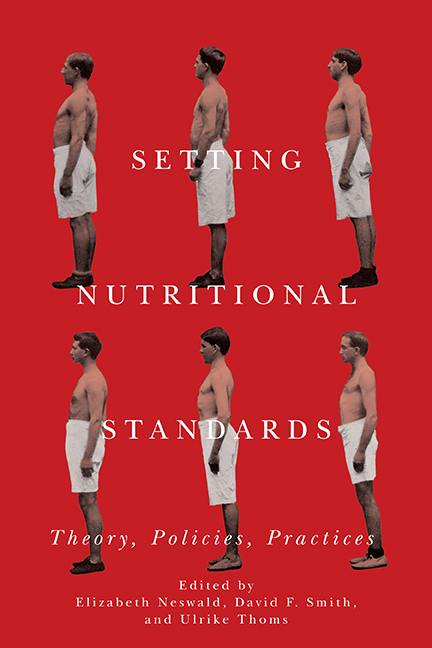Book contents
- Frontmatter
- Contents
- Acknowledgments
- Introduction
- 1 Nutritional Knowledge between the Lab and the Field: The Search for Dietary Norms in the Late Nineteenth and Early Twentieth Centuries
- 2 How Vegetarians, Naturopaths, Scientists, and Physicians Unmade the Protein Standard in Modern Germany
- 3 Of Carnivores and Conquerors: French Nutritional Debates in the Age of Empire, 1890–1914
- 4 Setting Standards: The Soldier's Food in Germany, 1850–1960
- 5 The Quest for a Nutritional El Dorado: Efforts to Demonstrate Dietary Impacts on Resistance to Infectious Disease in the 1920s and 1930s
- 6 “Not a Complete Food for Man”: The Controversy about White versus Wholemeal Bread in Interwar Britain
- 7 “Proscribing Deception”: The Gould Net Weight Amendment and the Origins of Mandatory Nutrition Labeling
- 8 When Is a Famine Not a Famine? Gauging Indian Hunger in Imperial and Cold War Contexts
- Selected Bibliography
- List of Contributors
- Index
6 - “Not a Complete Food for Man”: The Controversy about White versus Wholemeal Bread in Interwar Britain
Published online by Cambridge University Press: 18 April 2018
- Frontmatter
- Contents
- Acknowledgments
- Introduction
- 1 Nutritional Knowledge between the Lab and the Field: The Search for Dietary Norms in the Late Nineteenth and Early Twentieth Centuries
- 2 How Vegetarians, Naturopaths, Scientists, and Physicians Unmade the Protein Standard in Modern Germany
- 3 Of Carnivores and Conquerors: French Nutritional Debates in the Age of Empire, 1890–1914
- 4 Setting Standards: The Soldier's Food in Germany, 1850–1960
- 5 The Quest for a Nutritional El Dorado: Efforts to Demonstrate Dietary Impacts on Resistance to Infectious Disease in the 1920s and 1930s
- 6 “Not a Complete Food for Man”: The Controversy about White versus Wholemeal Bread in Interwar Britain
- 7 “Proscribing Deception”: The Gould Net Weight Amendment and the Origins of Mandatory Nutrition Labeling
- 8 When Is a Famine Not a Famine? Gauging Indian Hunger in Imperial and Cold War Contexts
- Selected Bibliography
- List of Contributors
- Index
Summary
Introduction
In June 1927 the New Health Society (NHS) issued a “Wholemeal Manifesto” that claimed wholemeal flour was “superior in nutritional value and vitamin content” to its white counterpart, which was “not a complete food for man.” The manifesto maintained that the daily requirement of vitamin B could only be “ensured by the use of wholemeal flour” in the working-class diet, which relied heavily on bread. Published in the mass-circulation Daily Mail, which welcomed this “striking and convincing confirmation” of its long-standing campaign for wholemeal bread, the manifesto was signed by “thirteen distinguished medical men and scientists.” The signatories included the NHS president Sir William Arbuthnot Lane and leading members of society, namely, the eugenicist Caleb Williams Saleeby, the radiologist Alfred Jordan, the physician S. Henning Belfrage, and the biochemist Robert Plimmer. Lane attributed “many of the ills of civilization” to “wrong habits of feeding” in a series of articles published in the Daily Mail the previous autumn, in which he highlighted the importance of vitamins to health and advocated wholemeal bread. The Journal of the American Medical Association, which reported on the “bread controversy,” noted that in support of his arguments Lane invoked the “accumulated intelligence of those who have made dietetics a life study—Gowland Hopkins, Plimmer, Hindhede, McCollum, McCarrison and others.”
Using the NHS's “Wholemeal Manifesto” as a jumping-off point, this chapter explores the debate about different types of bread and flour in Britain during the interwar years. Claims about the poor nutritional value of white bread and advocacy of wholemeal can be traced back to the nineteenth century, but the issue received renewed attention in the wake of the discovery of vitamins and the launch of health education pressure groups such as the NHS in the 1920s. The bread controversy focused on chemical properties and nutritional benefits, but these were framed within a wider cultural perspective. There was no general shift in favor of brown bread among nutritionists in interwar Britain, as suggested by Uwe Spiekermann. Rather, this chapter highlights that doctors, nutrition experts, and scientists continued to debate the merits of different types of bread and flour.
- Type
- Chapter
- Information
- Setting Nutritional StandardsTheory, Policies, Practices, pp. 142 - 164Publisher: Boydell & BrewerPrint publication year: 2017

